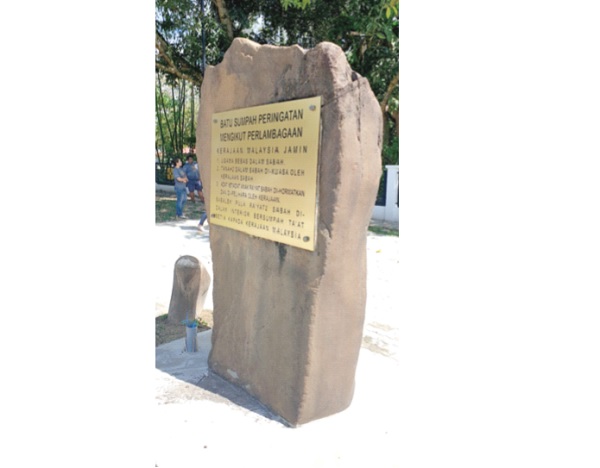Warisan praised for restoring words
Published on: Friday, January 04, 2019

Keningau: Parti Solidariti Tanah Airku (Star) President Datuk Dr Jeffrey Kitingan, thanked the Warisan-led State Government for restoring three crucial original words on the Batu Sumpah (Oath Stone) plaque, "Kerajaan Malaysia Jamin" (Malaysian Government Guarantees) which became an issue following replacement with a dubious plaque without these words in the 1980s and which went largely unnoticed until a few years ago."I am very happy and grateful to the Government for restoring the original words on the new Batu Sumpah plaque," he said.
ADVERTISEMENT
It was learnt that the new Oath Stone plaque was installed last November two months after it was moved to the new site without the key words. Although the original 1964 plaque that went missing for some 30 years was recovered a few years ago and verified by former State Secretary Tan Sri Richard Lind as authentic, it is still with the museum.Lind was tasked by then first Chief Minister Donald (later Fuad) Stephens in 1964 to discuss with the interior natives what their continued dissatisfaction towards Malaysia's formation were and what could be done to win them over.Jeffrey hoped the original plaque would be displayed in the museum as one of Sabah's historic treasures. Jeffrey, who is also Keningau Member of Parliament, noted the recent relocation of the Oath Stone to a new area near the Keningau Heritage Museum building enables Sabahans and tourists to visit without any restriction.The new site is more comfortable and suitable compared to previously where the Batu Sumpah was placed in the District Office's compound as a decoration.
ADVERTISEMENT
"Although we used to visit, we usually required the consent and approval of the relevant departments, including police and so on."This monument can also be made a tourism product (as a paper weight)," he said. The Oath Stone is the only such "magna carta" in the world where agreement towards a nation's creation by opposers – namely the interior natives led by Sedomon Gunsanad – was finally obtained a year after the formation when the British Government (although post-independence) agreed to having their key demands in the 20 Points to be inscribed in stone for perpetuity since they (natives) didn't trust anything signed on paper.
ADVERTISEMENT
These were primarily that Sabah would continue to enjoy freedom of religion, native customs and practices would be upheld and that land would be under State jurisdiction. Lind then identified a suitable rock from the Pegalan River on which the plaque was affixed and its launch involving a ritual by Bobohizans (priests and priestesses) on Aug. 31, 1964 was witnessed by the then Agung. The date was also significant because it was supposed to be the original date of Malaysia's formation to coincide with Malaya's independence date of 31.08.1957 but which had to be delayed by a last-minute fact-finding mission despatched by the United Nations.Jeffrey said the significance of the oath stone, origin, history and implications need to be recorded for the next generation's understanding of Sabah's political history. "This oath stone is very important because without the consent of the original people, especially in the interior of the three points recorded in this oath stone plague, Malaysia will not exist today."The first, freedom of religion that in Sabah there is no official religion respectively. This is also included in the IGC, Malaysia Agreement and 20 Points. But the current situation has changed."The second, land issues and land power. Which means land is dominated by Sabah. This includes what grows on the ground and what is buried in the soil such as minerals and oils, gases and anything else underground like natural resources."This has also been breached where our oil resources have been taken by Federal through Petronas and together with oil rights it is indeed the wealth and fundamentals of our economic strength," he said.Jeffrey said, in relation to this state-controlled land authority was also politically affected by the entry of Malayan parties into Sabah where the party from Malaya was in power in Sabah and its chief was the Chief Minister (under Umno).Thirdly, he said the customs and culture issues should be maintained and controlled by the state and unchanged or marginalised. And it seems that this is also getting lost due to the influence of modern technology as well as the influx of foreigners."One day when foreigners are more dominant the customs and customary laws of the indigenous people will disappear. This is what we are worried about."We understand the concerns of indigenous people especially in the interior when they used the oath stone as a condition to agree to the establishment of Malaysia because their lives were closely related to earth, land and custom."They hold on to the treaty as the Malay proverb says, 'biar mati anak jangan mati adat'. It means they swear to support Malaysia and also swear to make sure these three conditions will be respected and fulfilled."Jeffrey hoped Pakatan Harapan that ushered the new Malaysia will respect what is in the Oath Stone and also the Malaysia agreement and the 20 Points including what has been agreed upon in IGC not only verbally but implement and make it a reality.Stay up-to-date by following Daily Express’s Telegram channel.
Daily Express Malaysia




